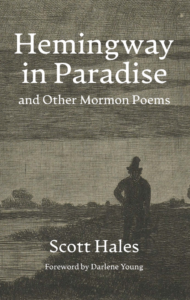 Hemingway in Paradise and Other Mormon Poems, my debut poetry collection, is available today. It is the first book published through the Mormon Lit Lab Mentoring Program. For those unfamiliar with the Mormon Lit Lab, it is a nonprofit organization designed to help Latter-day Saint writers receive the funding and guidance they need to produce and publish highly original works of Mormon literature. The program is currently helping eight writers—four fiction writers and four poets—develop their projects.
Hemingway in Paradise and Other Mormon Poems, my debut poetry collection, is available today. It is the first book published through the Mormon Lit Lab Mentoring Program. For those unfamiliar with the Mormon Lit Lab, it is a nonprofit organization designed to help Latter-day Saint writers receive the funding and guidance they need to produce and publish highly original works of Mormon literature. The program is currently helping eight writers—four fiction writers and four poets—develop their projects.
Hemingway in Paradise collects thirty-nine poems written between 2018 and 2022. Roughly half of them are playful speculations about the spirit world. The rest are stories and memories about mortal lives. I call them “Mormon poems” because they were written under the unambiguous influence of Mormonism.
Some of you are already familiar with my spirit world poems. They imagine the afterlives of various historical/cultural icons—people like Ernest Hemingway and André the Giant—to grapple with Latter-day Saint notions of sin, repentance, punishment, agency, judgment, and virtually every other concept we associate with the afterlife. I wrote the poems five years ago as part of the first Mormon Poetry Writing Month (MoPoWriMo) on Facebook. Six of them were later published in BYU Studies Quarterly.
These poems are meant to make you smile and think—as when Jonathan Edwards, the eighteenth-century Congregationalist preacher and theologian, abandons Calvinism to become an ace ping pong player. Or when Edgar Allan Poe cheats death to become a caretaker of whales in the Great Salt Lake. Some of the poems, however, are deliberately sobering. Christopher Columbus refuses to acknowledge making grievous mistakes in his divinely foretold discovery of the New World. Clyde Barrow, the Depression-era bank robber, pines for Bonnie Parker, his lover and partner in crime. And Nathan Bedford Forrest becomes his own tormentor over his role as the first Grand Wizard of the Ku Klux Klan.
My poems about mortality are more personal. One year for MoPoWriMo I wrote a series of poems based on childhood memories and more recent life events. Some of them, like “Primary Activity, 1984,” combine images from half-remembered events to tell a true-ish story that is better than anything that happened in real life. One of my favorite poems, “The Road out of Cardiff,” is a bizarre fantasy inspired by the real-life events surrounding the discovery of the Cardiff Giant in a New York field in 1869. The poem’s protagonist is John Boynton, one of the original members of the Quorum of the Twelve Apostles, who became a scientist and inventor after he left the Church in 1837. Readers will recognize right away when the poem departs from the facts. But I hope they also recognize how it engages themes of faith and skepticism to raise questions about truth, perception, reality, and God.
But mostly I hope readers have fun reading my poems—because I had fun writing them. For me, Mormonism is not just my corner of the faithscape. It is a fun place where I let my imagination roam free. Think of the poems in Hemingway in Paradise as tiny excursions into Mormonism’s imaginative potential. Each poem is a winding trail to somewhere new.

I’m very excited for others to finally get the chance to enjoy your poems as much as I do!
This book is a treasure. Every poem.
.
I’ve enjoyed every Scott poem so far. Why not the rest of them?